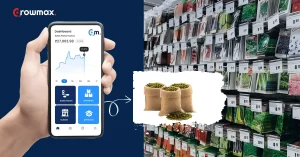Companies of all sizes are working hard to improve their operations. They are pushing their barriers to increase customer satisfaction and reduce the money they waste to compete in today’s fast-paced and competitive business environment.
To help this pursuit, they are heading towards tech-driven solutions like a Distribution Management System. A Distribution Management System (DMS) is a potent instrument that has established itself as an essential component in accomplishing these objectives.
This technology-driven solution plays a vital role in the simplification and management of numerous areas of distribution, which eventually leads to enhanced efficiency, improved decision-making, and increased profitability.
A company needs a Distribution Management System (DMS) software for several reasons, mainly if they distribute commodities, products, or services to consumers, retailers, wholesalers, or other businesses.
Here are some significant justifications why a business may want DMS software:
Data Analytics Capabilities:
DMS systems allow businesses to utilize the power of data analytics and reporting capabilities. Since most consumer goods companies are majorly offline, the first thing these systems do is to digitize them.
This digitization enables a two-fold opportunity for business. They are:
- The capability to track everything in real-time
- The capacity to mine insights from the data silos
These two capabilities enable businesses to eliminate insight delays and examine distribution trends, consumer preferences, and operational effectiveness.
And the payoff is that the decision-makers are empowered to make data-driven bold decisions. They can spot the opportunities for process optimization and eliminate any cost inefficiency.
Cost-Minimization
Inefficient operations result in high operational costs, the majority of which come from two sources:
- Over-stocking of inventory that results in Inventory Spoilage
- Under-stocking of inventory that results in Missed Opportunities
- Blurred sales leadership due to the lack of insights
DMS helps save these costs, enabling real-time visibility in the system, enhancing inventory management, and better allocating resources by automating various distribution operations.
Inventory Management
Gaining visibility over their secondary sales is a big challenge for companies. In other words, companies find it very hard to track their inventories once the shipments leave warehouses. They generally remain unaware of what is happening with their stocks beyond the distributor level.
A DMS software bridges this gap of visibility. It assists the distributors in managing their stocks and tracking their subordinate entities like sales reps and retail outlets.
As a result of this, companies can now see, manage, and control their stocks based on real-time data. This single feature saves crores of rupees that previously would simply go to waste because of inventory irregularities.
Team Management And Beat Optimization
A DMS solution optimizes every level of the supply chain. The lowest dynamic part of it is the sales fleet or sales teams. Usually, these sales teams operate completely unorganized, where the managers would have no means to communicate, direct, and control them.
The main issues with traditional Field Team Management are:
- Lack of visibility over the locations of the sales reps.
- Ineffective communication between managers and reps.
- Lack of control in terms of geo-fencing, area management, etc.
- There is no standard platform for task assignment and compliance checking.
- Inefficient, gut-based beat planning.
- Illegal trade practices.
A good DMS software eliminates all these limitations and provides an integrated platform for managers and reps to communicate and work on. Above that, it also makes Beat Route Planning easier. It uses intelligent algorithms to determine the most efficient and time-saving route for the sales reps, saving their time and enhancing their productivity.
Real-time Fulfillment Tracking
Fulfillment irregularities are a big headache for both distributors and companies. With a manual paper-pen-excel setup, distributors find it hard to keep track of all the retail orders and fulfill them in FIFO orders.
And afterward, they find it hard to track if their accomplishments are completed effectively or not.
A Distribution Management System eliminates these challenges by streamlining all the orders and digitizing the fulfillment process. It enables distributors to see exactly where they need to fulfill and the success rates of those fulfillments.
Customers and stakeholders can keep track of their orders’ status thanks to the DMS’s transparency.
Customer Relationship Management (CRM)
Managing customer interactions is a crucial element to keep the distribution streamlined. However, this part is extremely difficult for companies in the FMCG space.
The FMCG distributors have 100s of outlets to take care of. And each outlet has different sales/purchase patterns and personalized requirements from the distributors.
A Distribution Management System fulfills this need by acting as a customized CRM for the distributors. It bridges the gap between retailers’ needs and distributors’ fulfillment complexity.
Competitive Advantage
Since most FMCG companies rely on traditional methods and techniques to manage their operations, having a DMS is a big competitive advantage.
What other companies get done in weeks and months can be achieved by a DMS-equipped company in a matter of days. Above that, the visibility and control the top-level management gets from a DMS adds an extra layer of competitive and strategic advantage for such a company.
A DMS helps an FMCG firm deliver better customer experiences at quicker delivery times while maintaining increased operational efficiency.
Reduced Errors
Manual field operations like entering and handling data manually result in errors. These errors may range from wrong shipping, missing items, inaccurate billing, etc.
A Distribution Management Solution automates all these tasks. Because of such automation, all these errors and mistakes are automatically eliminated.
Scalability
Expansion always brings an equivalent level of complexity with it. The bigger an organization gets, the harder it becomes to manage it.
Such a level of complexity requires data-driven technologies. A DMS, in such a case, takes over the management of repeated tasks such as handling orders, managing records, processing that data to generate quick insights, and communicating everything to everyone.
Conclusion
Distribution Management System (DMS) software is no longer a luxury for today’s organizations. It is an absolute requirement for businesses serious about achieving success and expanding their operations.
It enables enterprises to navigate the complexities of distribution accurately and efficiently by providing efficient inventory management, order fulfillment, route optimization, demand forecasting, real-time tracking, data-driven insights, cost reduction, compliance, scalability, and a competitive edge.
DMS technology is a strategic step that can pave the path for sustainable growth, more excellent customer relationships, and increased profitability as industries evolve.




